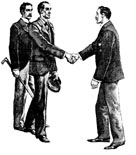
Knocking on the Church’s Door: Who Will Greet Me?
DO ALL THOSE WHO SEEK STILL FIND?
I was raised in an anti-religious family; my parents were ethnic Jews, with a strong commitment to social justice and an equal commitment to the Old Left’s Marxian dogma that religion is the opiate of the masses. I accepted their litany of political virtues readily, but not thoughtlessly; that is, I came to know how to defend them ably, and I even learned to refute the wrong-headed opinions of the other side. (I still think the other side is mostly wrong.) My acceptance of my parents’ strong atheism and anti-clericalism was more complicated, probably because they were not willing (or not able) to argue on behalf of them; rather, those views were simply asserted. Religion-talk made me feel vaguely uncomfortable, and prayer embarrassed me, as if someone had belched at the dinner table. I was, unlike my parents, not anti-religious in the strong sense; religion was mostly irrelevant and occasionally moderately intrusive. I had the habit of mind of the Left, but I lacked the philosophical justifications to make atheism and anti-clericalism convictions.
My habit of mind continued unchallenged through my early days as a college student at Berkeley in the mid-1960s. Political and social issues dominated. But during these early college years, there were two small, but I now think significant, awakenings. First, during a strike on campus, one of my professors was prompted to hold classes in a nearby Lutheran church. (It had never occurred to me that there were churches in Berkeley.) He lectured on Thomas More’s Utopia in front of a glorious cross. I recall being surprisingly inspired and moved by the setting. Though I no longer remember the cause of the momentous events that led to the strike that brought us together there, the images and sounds of that day in church will never leave me.
Second, there was a trip home during a vacation, during which my parents played a recording of Tom Lehrer’s witty anti-Catholic “Vatican Rag.” My parents laughed, the assembled laughed, I laughed, but I unexpectedly found myself uncomfortable with this facile anti-Catholicism. How, I asked myself, can we be demeaning the beliefs and customs of Catholics when we are so protective of protesting Buddhists in Vietnam and so supportive of a black Baptist minister and his black Baptist marchers for civil rights? How can we defend Chicano farm workers who are reared in the Catholic faith and who celebrate the Catholic Mass at their public meetings while we make fun of the faith that sustains them?
Catholicism took hold of me during a junior year abroad in Italy. I suspect that its attraction was initially cultural, affecting me in ways that even today I barely understand. In those days in Italy there was a culture of Catholicism, but not hegemonic in the way that postmodernists want us to understand pervasive cultural patterns. It was the culture of an old Catholic people — unassuming, tolerant, and devout in a way that only people who know who they are can be. I saw their Catholicism in their churches, in their art, in their literature, and in their daily language and customs; it was reflected in the most private and quiet recesses of the smallest chapels and in the architecture and design of the noisiest public places. It was, I discovered one foggy mid-winter night, in the most surprising place of all, in their hearts. An Italian friend of mine, a fiery leftist, full of anger at the world’s injustices, critical of all the governmental and economic elites which perpetuated injustice, passed me that night as I was heading back to the dormitory.
You May Also Enjoy
Reviews of Seeking the Heart of God... Mother Teresa: A Life in Pictures
The humble candle is a sacramental of the Church; it reminds us of Our Lord and our call to illumine this world with His light, and it is an assurance of His protection.
Who among us is rightly prepared for the inevitable?

